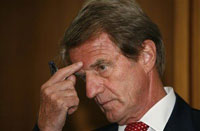EU considers sanctions against Russia
French Foreign Minister Bernard Kouchner says the European Union is now considering sanctions against Russia following its recognition of independence for the Georgian territories of South Ossetia and Abkhazia.

Kouchner says EU "sanctions are being considered." He spoke Thursday during a news conference in Paris. He gave no further details.
However, that is a sharp shift from his comments a few days ago, when he said the EU would not discuss sanctions against Russia.
France has called an EU meeting Monday in Brussels to focus on what steps the 27-member bloc will take in terms of aid to Georgia and future relations with Russia.
British Foreign Secretary David Miliband said Thursday that Russia's recent actions in Georgia and elsewhere threaten to undermine stability in Europe.
"We are in a situation which marks a clear end to the relative and growing calm in and around Europe since the collapse of the Soviet Union," Miliband said in an interview with British Broadcasting Corp. radio.
For about 15 years Europe's borders have been clearly demarcated, he said; "new nations have come out of the old Soviet Union, they've joined the European Union, and the European countries have enjoyed a period of unprecedented stability."
"I think the danger that arises from Russian actions is that that period comes to an end."
Miliband said his visit to Ukraine on Wednesday was intended to support that country's democratic choices, not to provoke Russia.
"I think that saying to a country like Ukraine that we are determined to support them in the democratic choices that they make is the right thing for a British foreign secretary to do," Miliband said.
In Kiev on Wednesday, he accused Moscow of succumbing to "the temptations of power politics" by invading Georgia and warned Russian President Dmitry Medvedev not to start a new Cold War. He said Russia's recognition Tuesday of South Ossetia - the separatist Georgian region at the heart of a war earlier this month - and another breakaway region, Abkhazia - was an attempt to redraw European borders.
If Russia "truly wants respect and influence, and the benefits which flow from it, then Russia needs to change course," he added in his speech.
In the radio interview, Miliband recalled U.S. diplomat George Kennan's view in the 1940s that Russia believed that its neighbors could only be enemies or vassals.
"I think Ukraine is a very important country in thinking about the map of Europe after the collapse of the Soviet Union," Miliband said. "Ukraine is a country of 46 million people. It's a neighbor of Russia. I think that Ukrainians want to have good relations with the West and also good relations with Russia."
Miliband rejected Moscow's view that NATO was being aggressive in offering the possibility of membership to Ukraine and Georgia.
"What has happened since the collapse of the Soviet Union is not a Western plot," he said.
"It is a series of decisions by independent, sovereign democracies about the course that they want to take _ not a course of confrontation with Russia, but a course of engagement with the West which I think is wholly within their rights."
Subscribe to Pravda.Ru Telegram channel, Facebook, RSS!


